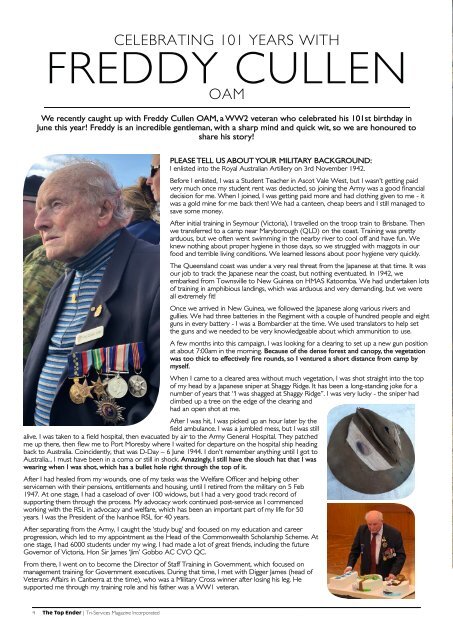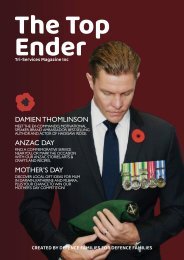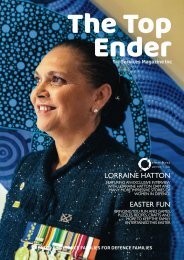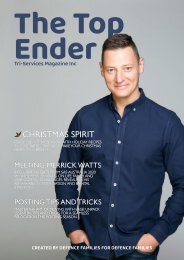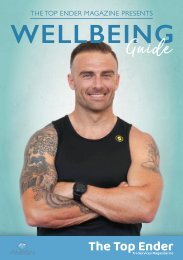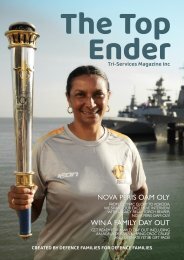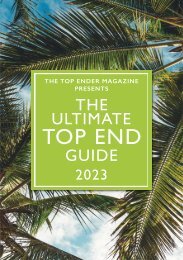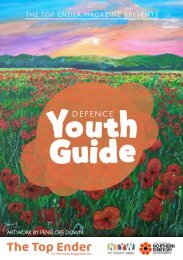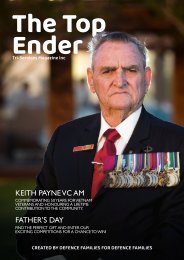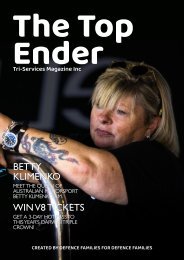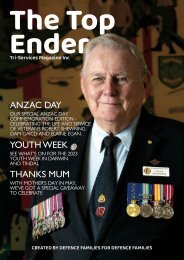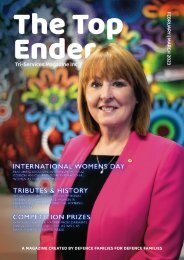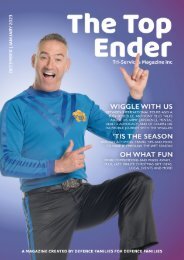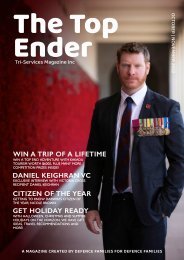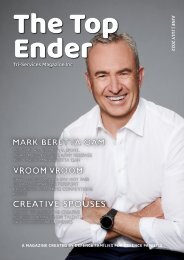Create successful ePaper yourself
Turn your PDF publications into a flip-book with our unique Google optimized e-Paper software.
CELEBRATING 101 YEARS WITH<br />
FREDDY CULLEN<br />
OAM<br />
We recently caught up with Freddy Cullen OAM, a WW2 veteran who celebrated his 101st birthday in<br />
June this year! Freddy is an incredible gentleman, with a sharp mind and quick wit, so we are honoured to<br />
share his story!<br />
PLEASE TELL US ABOUT YOUR MILITARY BACKGROUND:<br />
I enlisted into the Royal Australian Artillery on 3rd November 1942.<br />
Before I enlisted, I was a Student Teacher in Ascot Vale West, but I wasn’t getting paid<br />
very much once my student rent was deducted, so joining the Army was a good financial<br />
decision for me. When I joined, I was getting paid more and had clothing given to me - it<br />
was a gold mine for me back then! We had a canteen, cheap beers and I still managed to<br />
save some money.<br />
After initial training in Seymour (Victoria), I travelled on the troop train to Brisbane. <strong>The</strong>n<br />
we transferred to a camp near Maryborough (QLD) on the coast. Training was pretty<br />
arduous, but we often went swimming in the nearby river to cool off and have fun. We<br />
knew nothing about proper hygiene in those days, so we struggled with maggots in our<br />
food and terrible living conditions. We learned lessons about poor hygiene very quickly.<br />
<strong>The</strong> Queensland coast was under a very real threat from the Japanese at that time. It was<br />
our job to track the Japanese near the coast, but nothing eventuated. In 1942, we<br />
embarked from Townsville to New Guinea on HMAS Katoomba. We had undertaken lots<br />
of training in amphibious landings, which was arduous and very demanding, but we were<br />
all extremely fit!<br />
Once we arrived in New Guinea, we followed the Japanese along various rivers and<br />
gullies. We had three batteries in the Regiment with a couple of hundred people and eight<br />
guns in every battery - I was a Bombardier at the time. We used translators to help set<br />
the guns and we needed to be very knowledgeable about which ammunition to use.<br />
A few months into this campaign, I was looking for a clearing to set up a new gun position<br />
at about 7:00am in the morning. Because of the dense forest and canopy, the vegetation<br />
was too thick to effectively fire rounds, so I ventured a short distance from camp by<br />
myself.<br />
When I came to a cleared area without much vegetation, I was shot straight into the top<br />
of my head by a Japanese sniper at Shaggy Ridge. It has been a long-standing joke for a<br />
number of years that “I was shagged at Shaggy Ridge”. I was very lucky - the sniper had<br />
climbed up a tree on the edge of the clearing and<br />
had an open shot at me.<br />
After I was hit, I was picked up an hour later by the<br />
field ambulance. I was a jumbled mess, but I was still<br />
alive. I was taken to a field hospital, then evacuated by air to the Army General Hospital. <strong>The</strong>y patched<br />
me up there, then flew me to Port Moresby where I waited for departure on the hospital ship heading<br />
back to Australia. Coincidently, that was D-Day – 6 June 1944. I don’t remember anything until I got to<br />
Australia... I must have been in a coma or still in shock. Amazingly, I still have the slouch hat that I was<br />
wearing when I was shot, which has a bullet hole right through the top of it.<br />
After I had healed from my wounds, one of my tasks was the Welfare Officer and helping other<br />
servicemen with their pensions, entitlements and housing, until I retired from the military on 5 Feb<br />
1947. At one stage, I had a caseload of over 100 widows, but I had a very good track record of<br />
supporting them through the process. My advocacy work continued post-service as I commenced<br />
working with the RSL in advocacy and welfare, which has been an important part of my life for 50<br />
years. I was the President of the Ivanhoe RSL for 40 years.<br />
After separating from the Army, I caught the ‘study bug’ and focused on my education and career<br />
progression, which led to my appointment as the Head of the Commonwealth Scholarship Scheme. At<br />
one stage, I had 6000 students under my wing. I had made a lot of great friends, including the future<br />
Governor of Victoria, Hon Sir James ‘Jim’ Gobbo AC CVO QC.<br />
WHAT SKILLS/LESSONS HAVE YOU<br />
LEARNED IN THE MILITARY THAT YOU<br />
USED THROUGHOUT YOUR LIFE?<br />
I have learned a lot about weather systems and<br />
became a specialist in ballistic science. I also<br />
learned the importance of having colleagues you<br />
can rely on. Everyone needs a mate and it can<br />
be pretty lonely existence without them. I had a<br />
lot of close friends and it’s a wonderful aspect of<br />
Army service. I am now the last living member<br />
from my Regiment - my last mate recently<br />
passed away. Mateship is something that has<br />
endured right throughout my life. Remarkably,<br />
the Medic who patched me up in New Guinea<br />
in 1944 came to my 100th birthday celebration<br />
last June.<br />
FAVOURITE MEMORY FROM THE<br />
MILITARY?<br />
<strong>The</strong> Orderly Officer would come along in the<br />
morning and check that we had shaved. I didn’t<br />
have much facial hair back then, so I didn’t put<br />
much effort into shaving. <strong>The</strong> orderly officer<br />
came along and asked “Have you shaved this<br />
morning, Gunner?”.<br />
I confidently replied “Yes, Sir!” and he<br />
responded, “You need to stand closer to the<br />
razor!”<br />
That officer was a terrific leader and he was<br />
awarded a Military Cross in Guinea.<br />
BEST ADVICE YOU HAVE RECEIVED?<br />
Not to volunteer too readily for anything<br />
(laughs).<br />
Our sincere gratitude to Michael Marsh<br />
(RAA) for organising this interview - we are<br />
honoured to interview Freddy Cullen OAM<br />
and hear about his incredible life journey!<br />
Interviewed by Deb Herring<br />
Committee Member<br />
<strong>The</strong> <strong>Top</strong> <strong>Ender</strong> <strong>Magazine</strong><br />
In July 2020, Fred Cullen OAM was recognised in the Governor-General’s Kindness in<br />
the Community Awards.<br />
Mr Fred Cullen OAM from the Weary Dunlop Foundation is a terrific example of<br />
kindness in our community.<br />
A veteran of the Second World War, Fred has been doing good works for most of his<br />
From there, I went on to become the Director of Staff Training in Government, which focused on<br />
life (and that’s a long time). At 99 years old, he still exudes kindness in his relationships,<br />
management training for Government executives. During that time, I met with Digger James (head of<br />
but never in a self-seeking way. His is an energetic and altruistic kindness that both<br />
Veterans Affairs in Canberra at the time), who was a Military Cross winner after losing his leg. He<br />
recognises the worth of people and works to improve their welfare. This shines through<br />
supported me through my training role and his father was a WW1 veteran.<br />
in his advocating for Veterans’ and war widows’ benefits, and in his tireless tin-rattling for<br />
the Weary Dunlop Foundation and RSL over many decades. His genuine kindness and<br />
thoughtfulness serve as an inspiration to all, encouraging us to examine our own<br />
4 <strong>The</strong> <strong>Top</strong> <strong>Ender</strong> | Tri-Services <strong>Magazine</strong> Incorporated behaviours. Perhaps his kindness gives a clue to his longevity AUGUST/SEPTEMBER and contentedness. <strong>2022</strong> 5


